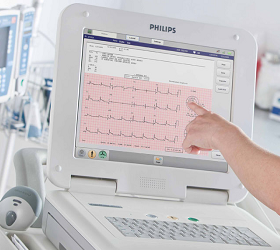
Median Salary
$36,256
Years of School
0-1
Job Outlook
Excellent
An EKG technician is responsible for monitoring and testing patient’s cardiovascular performance and are trained on using the special EKG equipment.
They will be able to take reading and provide the results of the functioning of the heart to the doctor for further analysis.
Job Description
The EKG technician uses special equipment to measure the performance of a patient’s heart.
They will attach electrodes to the body and record the impulses from the heart with the EGK machine.
They will need to be comfortable working with equipment and have a pleasant bedside manner in order to interact with patients.
The EKG technician will then provide this information for the physician to analyze.
The EKG tech is responsible for a number of things including:
- Overseeing the testing procedure
- Recording the EKG readings and information
- Performing a stress test
- Performing the Holter monitoring testing
- Provide the test results to the doctor
- Oversee all testing procedures
Salary
The average EKG technician makes around $36,256 a year.
Those on the low end make $28,408 while the top 10 percent of technicians make $47,155.
Technicians making the lower salary may not have a certification and are often starting out in the field.
Those on the higher end often have years of experience.
Many EKG technicians work in hospitals but some are finding employment in doctors’ offices.
They can also work in labs and diagnostic centers.
The techs work an average of 40 hours a week and depending on the location weekends may be part of that schedule.
Some EKG techs are on call.
Those that work in labs may work longer hours but many not work the standard five day work week.
Average Annual Salary by State
| State | Avg. Annual Salary |
|---|---|
| Alabama | $34,342 |
| Alaska | $41,109 |
| Arizona | $35,862 |
| Arkansas | $33,474 |
| California | $40,639 |
| Colorado | $36,586 |
| Connecticut | $39,011 |
| Delaware | $38,576 |
| Florida | $34,813 |
| Georgia | $35,645 |
| Hawaii | $37,744 |
| Idaho | $34,342 |
| Illinois | $38,359 |
| Indiana | $35,356 |
| Iowa | $34,957 |
| Kansas | $34,849 |
| Kentucky | $34,306 |
| Louisiana | $35,935 |
| Maine | $36,550 |
| Maryland | $37,129 |
| Massachusetts | $41,182 |
| Michigan | $37,274 |
| Minnesota | $38,612 |
| Mississippi | $32,207 |
| Missouri | $35,573 |
| Montana | $34,451 |
| Nebraska | $34,234 |
| Nevada | $37,708 |
| New Hampshire | $38,214 |
| New Jersey | $41,327 |
| New Mexico | $33,799 |
| New York | $43,462 |
| North Carolina | $35,464 |
| North Dakota | $33,763 |
| Ohio | $36,079 |
| Oklahoma | $34,378 |
| Oregon | $37,997 |
| Pennsylvania | $38,938 |
| Rhode Island | $38,323 |
| South Carolina | $34,161 |
| South Dakota | $31,845 |
| Tennessee | $33,546 |
| Texas | $35,935 |
| Utah | $34,306 |
| Vermont | $35,717 |
| Virginia | $36,296 |
| Washington | $39,590 |
| West Virginia | $33,003 |
| Wisconsin | $36,007 |
| Wyoming | $32,931 |
Education
Most people that perform cardiovascular testing need to earn an associate’s degree and many will need to work on their bachelor degree to obtain employment.
People that work with the EKG machine are often trained by their employer.
The training program lasts between four and six weeks.
All that is needed to be part of this training program is a high school diploma.
If a person has the proper certification they have a better chance of obtaining employment and will often see a higher salary than those with just a high school diploma.
High School Courses
It is recommended that a person looking to train as an EKG take certain courses in high school.
These courses may include health, anatomy, biology, physiology, and other science and math related courses.
Courses in the EKG Program
There are some specific EKG courses that a person should take.
They include courses on learning how to operate the equipment, the functions of the cardiovascular system, information about lab procedures, and some on the job experience.
Some of these courses are offered through an employer.
There are some technician schools that will offer this training as well.
Licensing & Certification
While a formal certification is not needed for employment as an EKG many employers prefer that a person completes a certification system that last for one year.
Some insurance companies including Medicare will only cover the costs if a person is seen by a Certified EKG Technician.
The more education a person has the better their job outlook will be.
There is a certification tests that has 110 questions that are multiple choice.
The test takes around 2 hours and will cost $110.
In order to keep the certification valid and active a person needs to complete 10 continuing education credit a year and pay an annual fee of $80 for their certification to stay active.
Job Outlook
The outlook for EKG technicians is very positive.
The career growth in this field is expected to grow as much as 17%t from 2016 to 2026.
This is greater in the area of growth than many other jobs.
As the population ages the need for EKG technicians will continue to show a growth.
As hospitals and labs advance their technology there will also be a demand for people that know how to work the EKG machine.
Employment in this field is expected to continue to grow.
Private Doctors’ offices as well as diagnostic labs are looking to hire a number of technicians to improve their practice and better serve their patients.